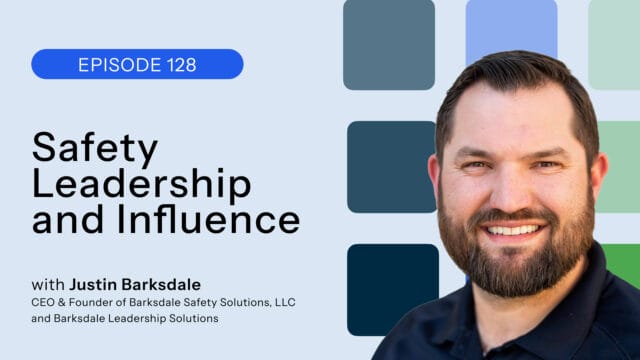
Safety Leadership and Influence with Justin Barksdale | Risk Matrix Episode 128
THE RISK MATRIX Cutting-edge podcast on occupational safety and risk management. Hosted by industry titans: JAMES JUNKIN, MS, CSP, MSP,…

The world of operator qualification (OQ) is transforming, and at the heart of this evolution lies technology. It’s clear that digital tools are no longer a supplementary element but a fundamental pillar in building robust, efficient, and compliant OQ programs.
Technology offers a powerful means to not only address the persistent skills gap within the industry but also to elevate the overall safety and reliability of operations.
One of the most impactful advancements is the widespread adoption of e-learning platforms. These digital environments provide unparalleled flexibility, allowing operators to engage with training modules at their own pace and convenience, regardless of their geographical location.
Imagine a scenario where a technician in a remote field location can access the same high-quality training as their counterpart in a central hub. This democratization of knowledge ensures consistency and standardizes the foundational understanding across the entire workforce. E-learning breaks down geographical barriers and allows for just-in-time training, ensuring operators have the knowledge they need when they need it most.
Furthermore, modern e-learning platforms transcend static presentations. They can be richly customized with interactive simulations, engaging quizzes, and multimedia elements such as videos and animations that cater to diverse learning styles and significantly enhance knowledge retention. This active engagement fosters a deeper understanding of concepts compared to passive learning methods.
Beyond the immediate training delivery, these platforms generate a wealth of valuable data on operator performance. By analyzing completion rates, assessment scores, time spent on modules, and areas of difficulty, companies gain actionable insights into individual and team proficiencies. This approach allows for targeted interventions, personalized learning paths, and the continuous refinement of training content to address specific skill gaps effectively and ensure all workers have the skills and knowledge to perform tasks.
The emergence of Virtual Reality (VR) and Augmented Reality (AR) technologies is adding another exciting dimension to OQ training, offering unique opportunities for practical skill development in controlled environments.
These immersive tools offer a safe and controlled environment for operators to practice complex and high-risk tasks without the potential for real-world consequences. Picture an apprentice using VR to meticulously simulate the intricate steps of pipeline inspection, including identifying potential anomalies and following correct procedures. This hands-on practice, even in a virtual realm, builds confidence, reinforces procedures, and significantly reduces the learning curve associated with critical operations before operators ever step into a potentially hazardous environment.
Augmented Reality, on the other hand, overlays digital information onto the operator’s real-world view. Imagine a field technician using AR glasses to receive step-by-step instructions for a maintenance procedure directly overlaid on the equipment they are working on. This provides real-time guidance, reduces the potential for errors, and enhances efficiency. AR can also be used for remote assistance, allowing experienced technicians to guide field operators through complex tasks virtually.
It’s crucial to maintain a balanced perspective. While the allure of VR and AR is undeniable, the tangible experience of working with physical equipment in the field remains indispensable. The nuances of real-world conditions, the feel of tools, and the sensory input from an actual operational environment cannot be entirely replicated.
Therefore, the most effective OQ programs will strategically integrate both technological simulations and robust experiential learning opportunities, including hands-on training and mentorship, to create well-rounded and competent operators.
Finally, the power of data analytics is revolutionizing how we understand and optimize OQ programs, moving beyond simple record-keeping to provide actionable intelligence.
By meticulously analyzing data streams from training platforms, evaluations, and even real-world operational incidents, companies can uncover valuable trends and patterns in operator performance. Are there specific tasks where operators consistently struggle across different regions? Are certain training modules proving significantly more effective in knowledge transfer than others? Identifying these trends allows for proactive adjustments to training content, delivery methods, and even operational procedures to address systemic issues.
This approach transforms OQ from a reactive compliance measure into a dynamic and continuously improving system that directly contributes to enhanced safety, efficiency, and overall operational excellence. By leveraging data analytics, companies can make informed decisions about resource allocation, training investments, and program adjustments to maximize the effectiveness of their OQ efforts and ensure a highly competent workforce.
Technology is no longer a peripheral tool in operator qualification; it is rapidly becoming the central nervous system of modern OQ programs. From flexible and engaging e-learning platforms to immersive VR/AR training and insightful data analytics, these digital advancements offer unprecedented opportunities to cultivate a highly skilled, consistently trained, and demonstrably competent workforce.
Embracing and strategically integrating these technological solutions will be important for organizations committed to operational excellence and a safer, more reliable future for the industry.
Veriforce provides comprehensive solutions designed to help companies seamlessly integrate technology into their OQ programs. Our platform offers the tools and capabilities to effectively deliver and manage digital training content, track operator qualifications in real-time, and leverage data analytics to gain valuable insights into workforce competency and compliance.
By partnering with Veriforce, organizations can streamline their OQ processes, ensure consistent compliance with regulatory requirements, and ultimately build a more efficient and safer operational environment. We are committed to empowering our clients to harness the power of technology and navigate the future of operator qualification with confidence.
Contact us today and allow a Veriforce OQ expert to guide you through the steps to achieve an optimized, defensible OQ program.


THE RISK MATRIX Cutting-edge podcast on occupational safety and risk management. Hosted by industry titans: JAMES JUNKIN, MS, CSP, MSP,…
We’ll send you practical and insightful supply chain risk management info that can benefit your business. Plus, important company updates that keep you in the loop.
